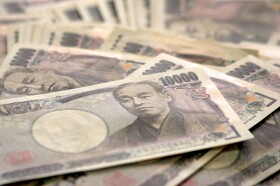The Japanese yen is rallying against a basket of currencies towards the end of the trading week, despite fears that the latest data might be signaling that Tokyo is in a recession. This has the central bank calling for additional stimulus should the national economy fall even further, which is applying more pressure on the federal government ahead of the important US-Japan trade talks.
On Thursday, the Cabinet Office released the latest findings of its coincident of business conditions for January. The latest index, which factors in industrial output and exports, fell 2.7 points to 97.9, representing the third consecutive monthly decline. This led the office to confirm that the data may be âsignaling a possible turning point,â a slight alteration from its previous remarks that the economy might be âweakening.â
This is important news for Japan because the country was witnessing the longest growth phase since the end of the Second World War. But, according to this index, the economy may have peaked in autumn.
Japan recently reported that its gross domestic product (GDP) bounced back in the fourth quarter at an annualized rate of 1.4%, even though the country experienced a string of natural disasters at the end of last summer. The economy still hiccupped as corporate profits endured their first quarterly drop since 2016, and the labor market may have reached its peak, too, in the October-to-December period.
Will Japan unleash more stimulus to turn things around? That is what one central bank official thinks Tokyo should do before it is too late.
Bank of Japan (BOJ) board member Yutaka Harada is recommending the central bank to initiate stimulus âwithout delayâ if risks to the economy continue to amplify and threaten its inflation targets.
He told a news conference in Kofu:
There is no clear data by which we can measure inflation expectations. Rather, we should look at whether the economy is worsening or whether inflation is slowing permanently. If the economy deteriorates to the extent that achieving the inflation target in the long term becomes difficult, itâs necessary to strengthen monetary easing without delay.
Ahead of the upcoming trade negotiations between the US and Japan, Washington has made it clear that it wants a currency clause inserted into any future trade agreement. But Japanese officials say there is very little need to talk currencies, noting that the link between exports and exchange rate has been âsevered.â
Considering that the US was able to successfully add a currency clause to the recent trade deal with Canada and Mexico, and could potentially get one with China, Japan may have no other choice but to concede.
The USD/JPY currency pair tumbled 0.15% to 111.60, from an opening of 111.77, at 16:10 GMT on Thursday. The EUR/JPY plunged 1.02% to 125.10, from an opening of 126.43.
If you have any questions, comments or opinions regarding the Japanese Yen,
feel free to post them using the commentary form below.
